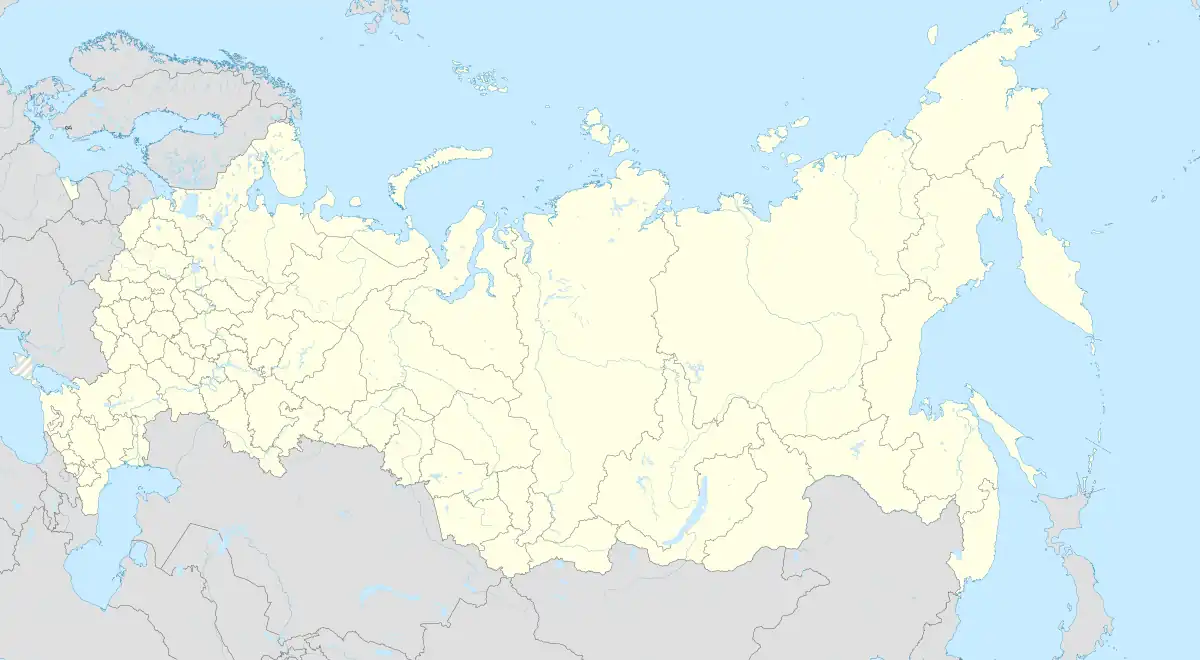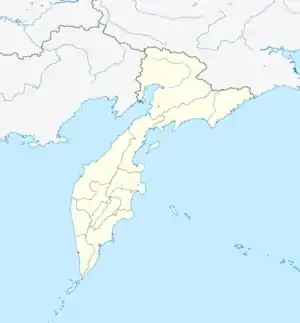| Kura Missile Test Range | |
|---|---|
| Near Klyuchi in Russia | |
 Kura Missile Test Range Location in Russia  Kura Missile Test Range Location in Kamchatka Krai, Russia | |
| Coordinates | 57°20′00″N 161°50′00″E / 57.33333°N 161.83333°E |
| Type | ICBM test range |
| Site information | |
| Owner | Russian Armed Forces |
| Operator | Russian Aerospace Forces (VKS) |
| Open to the public | No |
| Site history | |
| Built | 1955 |

Kura Missile Test Range (Russian: Ракетный полигон Кура́), originally known as Kama, is a Russian intercontinental ballistic missile impact area located in northern Kamchatka Krai in the Russian Far East. It is the destination for ballistic missiles which are test fired from other centers, and was chosen due to its remoteness and distance. It is 130 kilometers (81 mi) northeast of the settlement of Klyuchi and the military townlet is called Klyuchi-1, after the nearest settlement.[1][2]
History
The range was developed beginning in 1955 and was operational in 1957.[2][3] The first impact occurred on 21 August 1957, and was followed by 136 impacts through 1964.[4]
Although the range is a test site for intercontinental ballistic missiles, which are controlled by the Russian Strategic Rocket Forces, the range is administratively under Plesetsk Cosmodrome, and consequently is part of the Russian Space Forces.[5][6]
It continues to be active. An ICBM was launched here on 25 Oct 2023, after the Russian Parliament cancelled the Nuclear Test Ban treaty. [7] It was reported that the strategic nuclear submarine K-535 Yury Dolgoruky of Project 955 (Borei) on Wednesday, 29 October 2014 20:27 MSK (17:27 UTC) successfully conducted its fifth launch of Bulava submarine-launched ballistic missile (SLBM) at Kura firing range. On 30 October 2013 Russia conducted a large-scale exercise to check the readiness of its strategic forces. The Strategic Rocket Forces conducted two ICBM launches - a Topol missile was launched from the Plesetsk test site and an R-36M2 (RS-10V/SS-18) missile from a silo in Dombarovskiy. Both missiles delivered their warheads to the Kura test site in Kamchatka. Previous impact was recorded at 10:15 (06:15 GMT) on Wednesday 23 May 2012 when a new as yet unnamed ballistic missile designed to evade the US missile shield was tested. The missile was fired from a mobile launcher on the Plesetsk range. The warhead was delivered successfully to its designated area on the Kura range on Kamchatka.[8] A Bulava missile, launched from submarine Dimitri Donskoi, landed at Kura in October 2010.[9] Test launches of R-29RMU Sineva and RT-2PM2 Topol-M missiles also frequently target the Kura Missile Test Range.
United States surveillance
The Kura range attracted intense interest from United States intelligence agencies in 1957. There was early speculation that missiles were being launched from this range, but this was settled by information from Lockheed U-2 missions in summer 1957 which flew directly over the range and could find no launch infrastructure.[10] The study noted that impacts in the nearby water were likely, and that the Soviets were expected to install sonic detection systems to measure water impacts. The missions revealed a regiment of seven Mil Mi-4 helicopters based at Klyuchi which provided logistical support for the range.
Up to 1994, the United States maintained Eareckson Air Station (formerly Shemya Air Force Base) only 935 km (581 mi) away, equipped with radars and aircraft to monitor impacts at Kura. One of these radars, Cobra Dane, was fielded in 1977 at Shemya specifically for this purpose.
References
- ↑ Не каждая "Булава" долетит до середины Камчатки [Not every Bulava will reach the middle of Kamchatka] (in Russian). Novaya Gazeta. 5 May 2011. Archived from the original on 28 August 2012. Retrieved 2 July 2012.
- 1 2 Soviet Technical Capabilities in Guided Missiles and Space Vehicles, NIE 11-5-6, TOP SECRET, declassified 1996. Central Intelligence Agency. 1961.
- ↑ The Soviet ICBM Program, NIE 11-10-57, TOP SECRET, declassified 1995. Central Intelligence Agency. 1957.
- ↑ SOVIET ANTIBALLISTIC MISSILE ACTIVITY AT KAMCHATKA, 18 October 1965 (Top Secret, declassified 11 August 2003), Central Intelligence Agency, Washington D.C., 1965.
- ↑ "Russia creates Air and Space Defense Forces". russianforces.org. 1 December 2011. Archived from the original on 8 March 2012. Retrieved 25 December 2011.
- ↑ "Structure". Ministry of Defence of the Russian Federation. n.d. Archived from the original on 7 December 2011. Retrieved 6 February 2012.
- ↑ Началась тренировка стратегических сил сдерживания под руководством Путина, 25 October 2023 https://iz.ru/1595079/2023-10-25/nachalas-trenirovka-strategicheskikh-sil-sderzhivaniia-pod-rukovodstvom-putina
- ↑ "Russia tests prototype of a new ICBM". russianforces.org. 23 May 2012. Archived from the original on 16 July 2012. Retrieved 1 July 2012.
- ↑ Начальник Генштаба доложил Президенту об успешном пуске ракеты "Булава" [The Chief of the General Staff reported to the President on the successful launch of the Bulava missile] (in Russian). Kremlin.ru. 7 October 2010. Archived from the original on 19 February 2014. Retrieved 1 July 2012.
- ↑ GUIDED MISSILE INTELLIGENCE FROM THE KLYUCHI/KAMCHATKA COVERAGE, 22 August 1957 (Top Secret, declassified 26 April 2001), Central Intelligence Agency, Washington D.C., 1957.